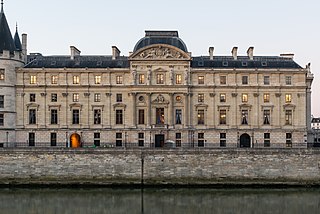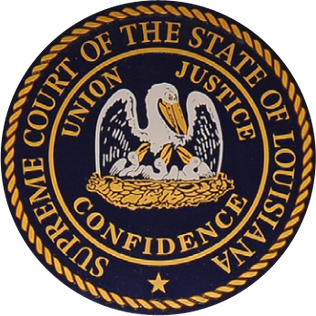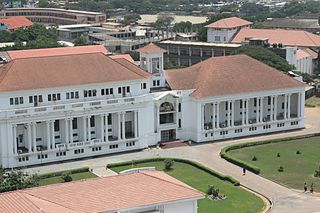Chief judge may refer to:
Chief judge may refer to:
The highest-ranking or most senior member of a lower court or circuit court with more than one judge.
Some of Chief justice positions around supreme courts of world are translated as Chief judge as following.

The Supreme Court of the United States (SCOTUS) is the highest court in the federal judiciary of the United States. It has ultimate appellate jurisdiction over all U.S. federal court cases, and over state court cases that turn on questions of U.S. constitutional or federal law. It also has original jurisdiction over a narrow range of cases, specifically "all Cases affecting Ambassadors, other public Ministers and Consuls, and those in which a State shall be Party." The court holds the power of judicial review, the ability to invalidate a statute for violating a provision of the Constitution. It is also able to strike down presidential directives for violating either the Constitution or statutory law.

A judge is a person who presides over court proceedings, either alone or as a part of a panel of judges. In an adversarial system, the judge hears all the witnesses and any other evidence presented by the barristers or solicitors of the case, assesses the credibility and arguments of the parties, and then issues a ruling in the case based on their interpretation of the law and their own personal judgment. A judge is expected to conduct the trial impartially and, typically, in an open court.

The Court of Cassation is the supreme court for civil and criminal cases in France. It is one of the country's four apex courts, along with the Council of State, the Constitutional Council and the Jurisdictional Disputes Tribunal.
The Supreme Court of the State of New York is the trial-level court of general jurisdiction in the judiciary of New York. It is vested with unlimited civil and criminal jurisdiction, although in many counties outside New York City it acts primarily as a court of civil jurisdiction, with most criminal matters handled in County Court.
An associate justice or associate judge is a judicial panel member who is not the chief justice in some jurisdictions. The title "Associate Justice" is used for members of the Supreme Court of the United States and some state supreme courts, and for some other courts in Commonwealth of Nations countries, as well as for members of the Supreme Court of the Federated States of Micronesia, a former United States Trust Territory. In other common law jurisdictions, the equivalent position is called "Puisne Justice".

The Supreme Court of India is the supreme judicial authority and the highest court of the Republic of India. It is the final court of appeal for all civil and criminal cases in India. It also has the power of judicial review. The Supreme Court, which consists of the Chief Justice of India and a maximum of fellow 33 judges, has extensive powers in the form of original, appellate and advisory jurisdictions.

The Oregon Supreme Court (OSC) is the highest state court in the U.S. state of Oregon. The only court that may reverse or modify a decision of the Oregon Supreme Court is the Supreme Court of the United States. The OSC holds court at the Oregon Supreme Court Building in Salem, Oregon, near the capitol building on State Street. The building was finished in 1914 and also houses the state's law library, while the courtroom is also used by the Oregon Court of Appeals.

The Supreme Court of the State of North Carolina is the state of North Carolina's highest appellate court. Until the creation of the North Carolina Court of Appeals in the 1960s, it was the state's only appellate court. The Supreme Court consists of six associate justices and one chief justice, although the number of justices has varied. The primary function of the Supreme Court is to decide questions of law that have arisen in the lower courts and before state administrative agencies.

The Supreme Court (Filipino: Kataas-taasang Hukuman; colloquially referred to as the Korte Suprema, is the highest court in the Philippines. The Supreme Court was established by the Second Philippine Commission on June 11, 1901 through the enactment of its Act No. 136, an Act which abolished the Real Audiencia de Manila, the predecessor of the Supreme Court.

The Supreme Court of Florida is the highest court in the U.S. state of Florida. It consists of seven justices—one of whom serves as Chief Justice. Six members are chosen from six districts around the state to foster geographic diversity, and one is selected at large.

The Indiana Supreme Court, established by Article 7 of the Indiana Constitution, is the highest judicial authority in the state of Indiana. Located in Indianapolis, the Court's chambers are in the north wing of the Indiana Statehouse.

The Connecticut Supreme Court, formerly known as the Connecticut Supreme Court of Errors, is the highest court in the U.S. state of Connecticut. It consists of a Chief Justice and six Associate Justices. The seven justices sit in Hartford, across the street from the Connecticut State Capitol. The court generally holds eight sessions of two to three weeks per year, with one session each September through November and January through May. Justices are appointed by the governor and then approved by the Connecticut General Assembly.

The Supreme Court of Korea is the highest ordinary court in the judicial branch of South Korea, seated in Seocho, Seoul. Established under Chapter 5 of the Constitution of South Korea, the Court has ultimate and comprehensive jurisdiction over all cases except those cases falling under the jurisdiction of the Constitutional Court of Korea. It consists of fourteen Justices, including the Chief Justice of the Supreme Court of Korea. The Supreme Court is at the top of the hierarchy of all ordinary courts in South Korea, and traditionally represented the conventional judiciary of South Korea. The Supreme Court has equivalent status as one of the two highest courts in South Korea. The other is the Constitutional Court of Korea.

The chief justice of the Supreme Court of Korea is the chief justice of the Supreme Court of Korea. As presiding judge of the grand bench composed of two-thirds of fourteen Supreme Court justices, the chief represents the Supreme Court of Korea. The chief justice is regarded as one of two equivalent heads of judicial branch in Government of South Korea. Another head is the president of the Constitutional Court of Korea. The current chief justice of the Supreme Court of Korea is vacant and Supreme Court Justice Ahn Chul-sang is acting as the chief justice of the Supreme Court of Korea.

The Supreme Court of Louisiana is the highest court and court of last resort in the U.S. state of Louisiana. The modern Supreme Court, composed of seven justices, meets in the French Quarter of New Orleans.

The Montana Supreme Court is the highest court of the state court system in the U.S. state of Montana. It is established and its powers defined by Article VII of the 1972 Montana Constitution. It is primarily an appellate court which reviews civil and criminal decisions of Montana's trial courts of general jurisdiction and certain specialized legislative courts, only having original jurisdiction in a limited number of actions. The court's Chief Justice and six Associate Justices are elected by non-partisan, popular elections. The Montana Supreme Court meets in the Joseph P. Mazurek Building in Helena, Montana, the state's capital, an international style building completed in 1982 and named in the honor of former Montana Attorney General, Joseph P. Mazurek.

The Supreme Court of Ghana is the highest judicial body in Ghana. Ghana's 1992 constitution guarantees the independence and separation of the Judiciary from the Legislative and the Executive arms of government.
The Supreme Court of Estonia is the court of last resort in Estonia. It is both a court of cassation and a constitutional court. The courthouse is in Tartu.

The judiciary of India is the system of courts that interpret and apply the law in the Republic of India. India uses a common law system, first introduced by the British East India Company and with influence from other colonial powers and Indian princely states, as well as practices from ancient and medieval times. The Constitution of India provides concept for a single and unified judiciary in India.
The Judiciary of Vermont is the state court system of Vermont, charged with Vermont law.